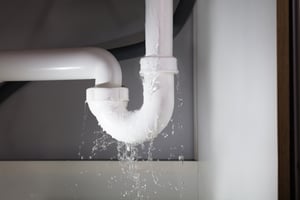 Life isn’t possible without water. But for all its life-giving benefits, water can also be a destructive force of nature. If you rank all the potential disasters that could hit your property, water damage will stand an excellent chance of taking the top spot.
Life isn’t possible without water. But for all its life-giving benefits, water can also be a destructive force of nature. If you rank all the potential disasters that could hit your property, water damage will stand an excellent chance of taking the top spot.
Water damage affects buildings on so many levels. When water creeps into areas of your property where it shouldn’t be, your floor could warp. Water damage also discolors beautifully painted walls. All that moisture can also lead not only to the formation of mold inside the building but also to a vermin infestation. Worst of all, water damage that isn’t immediately addressed through water damage restoration could eventually weaken the foundation of any building.
Water damage is also deceptively costly. You might think that an inch or two of water flooding your home or business wouldn’t burn a hole in your pocket, but there have been cases where that little amount of water has caused damage that cost tens of thousands of dollars to repair and restore.
The worst thing about water damage is that it can happen anytime. Let’s look at some of the common causes of water damage.
Severe weather
Thunderstorms, hurricanes, and other natural disasters don’t happen daily, but when they do, there’ll always be the risk of water damage striking your property.
The strong winds and heavy downpours could damage your roof, sending a certain amount of rainwater straight down into your house or business. Worse, severe weather can sometimes lead to flash flooding, especially when your property is in a flood-prone area.
Clogged gutters
Your home’s gutter system is supposed to draw rainwater away from your house. However, gutters often get blocked by leaves, branches, and other types of debris over time. When that happens, rainwater won’t be able to flow properly away from your property and will instead overflow the edges of your gutters, run down the side of the house, and cause water damage to the ceiling, walls, and floors.
Leaking pipes
A loose-fitting pipe in the kitchen sink could leak enough water to damage the cabinet underneath it. A broken pipe inside the wall could make things even more complicated. The entire wall could be damaged, fostering the formation of mold.
Worse yet would be a leaking plumbing supply line or a drainage pipe in the soil underneath your concrete slab. When this happens, you’ll likely face costly repairs.
Washing machine water supply line leak
Your washing machine is fed by water supply lines that are under constant pressure. You have nothing to worry about if your lines are made from braided stainless steel. The problem will be if your washing machine has rubber or PVC supply lines. They can quickly wear out and rupture, which means your entire laundry room will be flooded in minutes if you don’t shut off the water source in time.
Condensation from AC
Your air conditioning unit produces condensation, with the moisture dripping from the unit’s evaporator coil into a drain pan and out of your property through a condensate drain line. This drainage system works until the drain pan is damaged or the condensate drain line is clogged with dust or dirt.
With the water unable to get out, it will leak from your AC straight into your home. All that water dripping from your AC unit can damage the floor and walls and even make your insulation soggy.
Blocked drains
The drains in your kitchen sink, bathroom floor, and bathtub clog up for many reasons. Hair, grease buildup, toiletries, dirt, toys, and other foreign objects could obstruct the drainpipe and prevent normal drainage. When not dealt with immediately, clogged drains can easily back up and cause flooding and water damage inside your property.
Malfunctioning sprinkler systems
Once activated during a fire, a sprinkler system will save your property and life. The problem is that there have been incidents where older sprinkler systems have turned themselves on even when there isn’t the slightest indication of a fire. As you can guess, the water damage a malfunctioning or accidentally set-off sprinkler system causes can be considerable, especially when computers and other electronic appliances are all over your property.
Leaking water heater
If you have an old water heater, the likelihood that it’ll eventually spring a leak is high. The same goes for poorly maintained or badly installed water heaters. Sometimes, the leak is brought about by too much tank pressure. When a water heater leaks, you can expect your basement, where it’s presumably located, to be flooded quickly.
Preventing water damage may be challenging, but it’s not impossible. Address the possible causes mentioned above, and you just might have a chance of at least minimizing water damage.
So many variables can come into play when determining insurance coverage. Please review your policy with your agent; they will be able to answer any questions you have about your coverages, or they can check with the carrier for you.
Author Bio: Rachel Anderson is the Content Marketing Strategist at Arizona Fire & Water Restoration, Inc., a Phoenix-based company that provides water, fire, and smoke damage restoration as well as mold remediation and removal services. When not writing, she bowls and goes on trail hikes with her friends.
This article is intended for general educational and illustrative purposes only and should not be construed to communicate legal or professional advice. Further, this article is not an offer to sell insurance. Please consult with your licensed insurance agent for specific coverage details and your insurance eligibility. All policies are subject to the terms, conditions, limitations, definitions, and exclusions contained therein.





